Jeep Avenger vs Honda Jazz – Differences & prices compared
Compare performance, boot space, consumption and price in one view.
Find out now: which car is the better choice for you – Jeep Avenger or Honda Jazz?
The Jeep Avenger (SUV) comes with a Electric, Petrol or Petrol MHEV engine and Automatic or Manuel transmission. In comparison, the Honda Jazz (Hatchback) features a Full Hybrid engine with Automatic transmission.
When it comes to boot capacity, the Jeep Avenger offers 380 L, while the Honda Jazz provides 304 L – depending on how much space you need. If you’re looking for more power, decide whether the 156 HP of the Jeep Avenger or the 122 HP of the Honda Jazz suits your needs better.
In terms of consumption, the values are 15.50 kWh4.90 L per 100 km for the Jeep Avenger, and 4.50 L for the Honda Jazz.
Price-wise, the Jeep Avenger starts at 21900 £, while the Honda Jazz is available from 23100 £. Compare all the details and find out which model fits your lifestyle best!
Jeep Avenger
The Jeep Avenger is a compact SUV that brings a blend of rugged design and modern technology, making it ideal for both urban and off-road adventures. Its robust build and distinctive styling capture Jeep's iconic spirit while offering a comfortable and refined driving experience. With advanced safety features and a versatile interior, the Avenger caters to a wide range of drivers looking for practicality and excitement.
details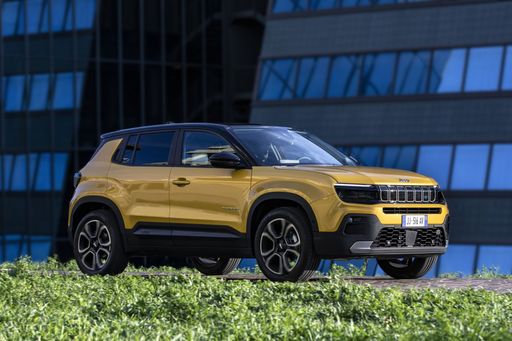 @ Stellantis
@ Stellantis
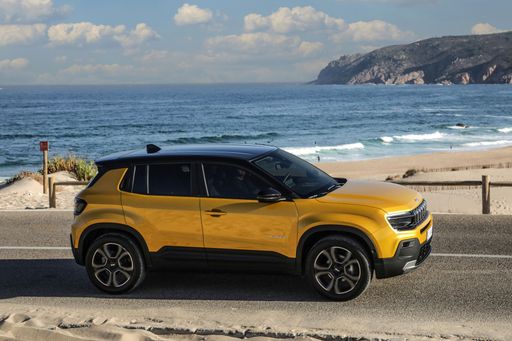 @ Stellantis
@ Stellantis
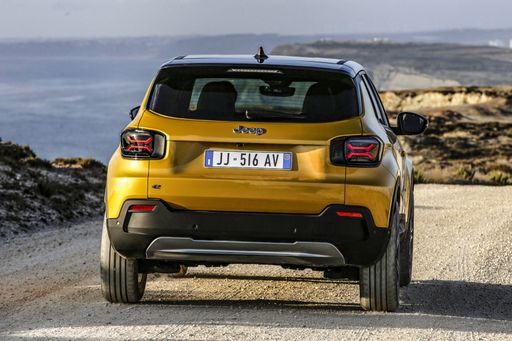 @ Stellantis
@ Stellantis
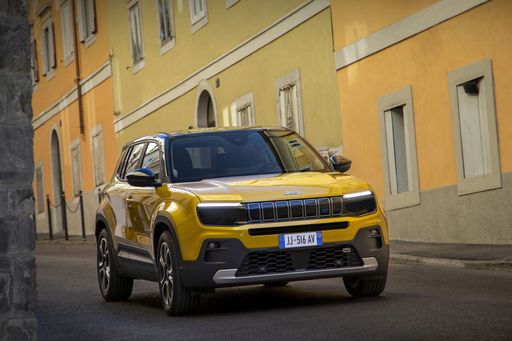 @ Stellantis
@ Stellantis
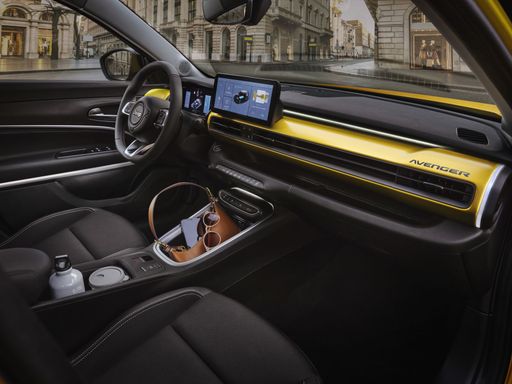 @ Stellantis
@ Stellantis
Honda Jazz
The Honda Jazz stands out in the compact car category with its intelligently designed interior, offering a surprisingly spacious cabin that comfortably accommodates passengers and luggage. Its efficient hybrid powertrain ensures a smooth and economical driving experience, ideal for both urban commutes and longer journeys. Furthermore, the Jazz is equipped with a range of advanced safety features, providing peace of mind while on the road.
details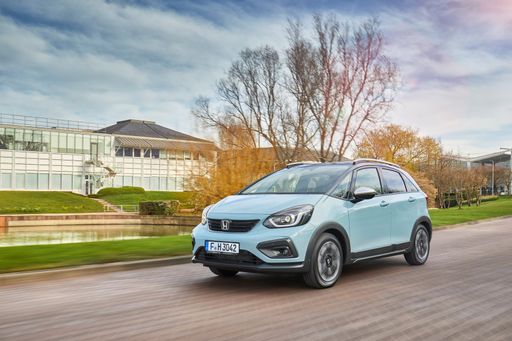 @ hondanews.eu
@ hondanews.eu
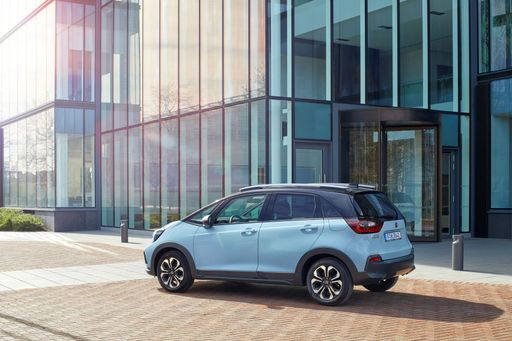 @ hondanews.eu
@ hondanews.eu
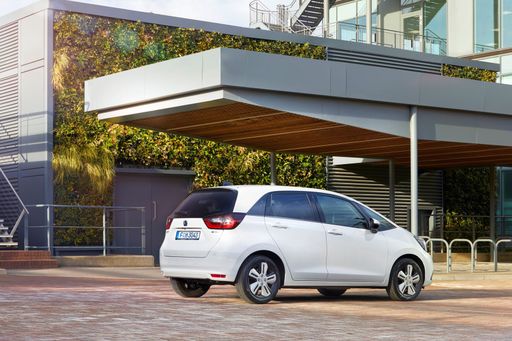 @ hondanews.eu
@ hondanews.eu
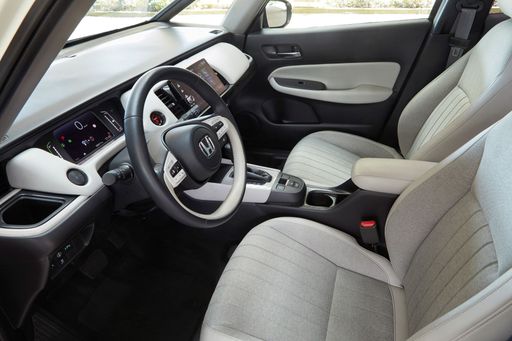 @ hondanews.eu
@ hondanews.eu
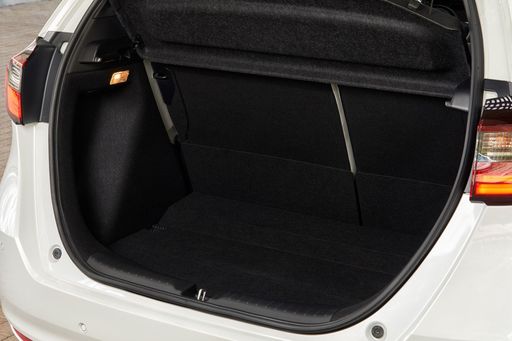 @ hondanews.eu
@ hondanews.eu

|

|
|
|
|
Costs and Consumption |
|
|---|---|
|
Price
21900 - 36900 £
|
Price
23100 - 26700 £
|
|
Consumption L/100km
4.9 - 5.7 L
|
Consumption L/100km
4.5 - 4.8 L
|
|
Consumption kWh/100km
15.50 kWh
|
Consumption kWh/100km
-
|
|
Electric Range
400 km
|
Electric Range
-
|
|
Battery Capacity
51 kWh
|
Battery Capacity
-
|
|
co2
0 - 129 g/km
|
co2
102 - 108 g/km
|
|
Fuel tank capacity
44 L
|
Fuel tank capacity
40 L
|
Dimensions and Body |
|
|---|---|
|
Body Type
SUV
|
Body Type
Hatchback
|
|
Seats
5
|
Seats
5
|
|
Doors
5
|
Doors
5
|
|
Curb weight
1180 - 1520 kg
|
Curb weight
1302 - 1320 kg
|
|
Trunk capacity
325 - 380 L
|
Trunk capacity
304 L
|
|
Length
4084 - 4088 mm
|
Length
4089 - 4105 mm
|
|
Width
1776 mm
|
Width
-
|
|
Height
1527 - 1541 mm
|
Height
1526 - 1556 mm
|
|
Payload
494 - 502 kg
|
Payload
370 - 388 kg
|
Engine and Performance |
|
|---|---|
|
Engine Type
Electric, Petrol, Petrol MHEV
|
Engine Type
Full Hybrid
|
|
Transmission
Automatic, Manuel
|
Transmission
Automatic
|
|
Transmission Detail
Manual Gearbox, Dual-Clutch Automatic
|
Transmission Detail
-
|
|
Drive Type
Front-Wheel Drive, All-Wheel Drive
|
Drive Type
Front-Wheel Drive
|
|
Power HP
100 - 156 HP
|
Power HP
122 HP
|
|
Acceleration 0-100km/h
9 - 10.6 s
|
Acceleration 0-100km/h
9.4 - 9.7 s
|
|
Max Speed
150 - 194 km/h
|
Max Speed
175 km/h
|
|
Torque
205 - 260 Nm
|
Torque
253 Nm
|
|
Number of Cylinders
3
|
Number of Cylinders
4
|
|
Power kW
74 - 115 kW
|
Power kW
90 kW
|
|
Engine capacity
1199 cm3
|
Engine capacity
1498 cm3
|
General |
|
|---|---|
|
Model Year
2023 - 2025
|
Model Year
2023
|
|
CO2 Efficiency Class
A, D, C
|
CO2 Efficiency Class
C
|
|
Brand
Jeep
|
Brand
Honda
|
Jeep Avenger
Unveiling the Jeep Avenger: A New Era of Innovation
The Jeep Avenger marks a significant milestone in automotive evolution, blending ruggedness with modern-day advancements. Established within the SUV category, the Avenger offers an eclectic mix of powertrains, including electric and hybrid options, catering to the diverse requirements of the modern motorist.
Powertrain Options: Efficiency Meets Performance
The Jeep Avenger presents multiple powertrain configurations, each designed to harmonise performance with efficiency. The electric version boasts a formidable 156 PS and a battery capacity of 51 kWh, enabling a remarkable 400 km of electric range. This places it at the forefront of environmentally friendly travel with a consumption of merely 15.4 kWh/100km.
Additionally, for those favouring classic combustion engines, the 1.2 e-Hybrid and the purely petrol 1.2 GSE T3 offer 100 PS and incorporate innovative mild-hybrid technology to enhance fuel efficiency while maintaining a spirited driving experience.
Advanced Engineering: Technology and Design
At the heart of the Jeep Avenger lies a well-engineered chassis, tailored for both agility and comfort. Measuring 4084 mm in length, 1776 mm in width, and up to 1534 mm in height, the Avenger ensures ample space within a compact footprint, ideal for urban manoeuvrability.
The vehicle supports its robust engineering with meticulous design details, from its substantial boot capacity of up to 380 litres to its five-door configuration, seamlessly blending functionality with aesthetic appeal.
Driving Dynamics and Performance
Front-wheel drive ensures that the Avenger's power is perfectly harnessed for both city streets and off-road trails. The vehicle's acceleration capabilities vary between 9 and 10.9 seconds from 0-100 km/h, a testament to its spirited performance ethos. With a maximum speed ranging up to 184 km/h, the Avenger is built to deliver thrilling drives.
Sustainability at the Forefront
As a reflection of Jeep's commitment to sustainability, the Avenger achieves commendable CO2 efficiency ratings spanning classes A to D. The electric model stands out with zero emissions, while hybrid options offer competitive CO2 figures, appealing to eco-conscious drivers.
Pricing and Trim Levels
The Jeep Avenger is strategically priced between 25,000 and 43,500 €, ensuring accessibility for a broad range of customers. With available trim levels such as Longitude, Altitude, and Summit, prospective buyers can tailor their vehicles to suit individual preferences, choosing from different feature sets and functionalities.
Conclusion: The Jeep Avenger's Promise
The Jeep Avenger is not just a new vehicle; it embodies a shift towards innovative, efficient, and dynamic motoring. By merging advanced technology with Jeep's legendary prowess, the Avenger is poised to redefine expectations within the SUV sector, offering both cutting-edge performance and unyielding reliability.
Honda Jazz
The Evolution of the Honda Jazz: A Modern Marvel in Compact Design
The Honda Jazz, known for its compact yet spacious design, continues to impress with its blend of practicality and innovation. Today, we delve into the technical details and innovations that make the latest models of the Honda Jazz stand out in the competitive auto market.
Hybrid Powertrain: Efficiency and Performance
The Honda Jazz is equipped with a cutting-edge 1.5 i-MMD e:HEV full hybrid engine, delivering an impressive 122 PS, or 90 kW. This powertrain seamlessly balances efficiency and performance, achieving a fuel consumption of 4.5 to 4.8 L/100km. Whether navigating the city streets or taking on longer journeys, the Jazz provides a responsive and smooth driving experience, accentuated by its CVT automatic transmission.
Sleek Design with Smart Storage Solutions
Staying true to its roots, the Honda Jazz maintains a compact exterior with dimensions ranging from 4089 to 4105 mm in length and 1526 to 1556 mm in height. Despite its size, the Jazz offers ample luggage capacity of 304 litres, thanks to the intelligent Magic Seat system that allows for flexible storage configurations. The combination of a sleek design with practical storage makes the Jazz an ideal city companion.
Advanced Technology and Comfort
The Honda Jazz doesn’t stop at efficiency; it also comes packed with a plethora of technological features. As part of its high-tech package, the Jazz includes a state-of-the-art infotainment system and various driving assistance technologies, enhancing both safety and comfort. Families and commuters alike will appreciate the thoughtfully designed interior, seating up to five passengers with ease.
Performance and Handling Dynamics
The driving experience of the Honda Jazz is primarily characterised by its lively handling and assured grip thanks to its front-wheel-drive configuration. With a torque of 253 Nm and a 0-100 km/h acceleration between 9.4 to 9.7 seconds, the Jazz offers adequate performance for everyday urban driving. The maximum speed reaches 175 km/h, ensuring the Jazz can hold its own on motorways too.
Environmental Responsibility and Cost Efficiency
In an era of heightened environmental awareness, the Honda Jazz stands out with a CO2 emission range of 102 to 108 g/km, adhering to the CO2 Efficiency Class C. Cost-conscious consumers will appreciate the Jazz's low running costs, with potential expenses ranging from €812 to €877 per month and a cost per kilometre of 32.5 to 35.1 cents.
Conclusion: A Comprehensive Package
Combining innovation, economy, and style, the Honda Jazz serves as a testament to Honda's commitment to evolving their compact range to meet the modern driver's needs. For those seeking a reliable, efficient, and technologically advanced vehicle, the Honda Jazz stands ready to elevate their driving experience.
The prices and data displayed are estimates based on German list prices and may vary by country. This information is not legally binding.
